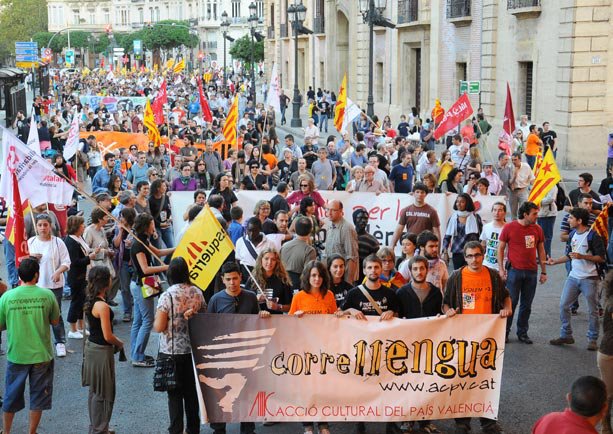
In the far east of Spain, the Valencian Community, one of the 17 autonomous communities of Spain, stands strong in its ethnic and cultural identity. Founded in 1978 with first president, Joan Fuster, the Cultural Action of the Valencian Country (called Accio Cultural del Pais Valencia in Catalan) is a cultural nonprofit association that was established to preserve the rights of the Valencian people, its culture, and especially the language: Catalan.
Joan Andreu Quiles Rodas is the Secretary of Organization of “Joves d’Acci,” the youth section of the Cultural Action.
“The association is very important because it preserves the rights of Valencia from attacks of government and institutions,” said Rodas. “In turn, it helps preserve the culture and teach the world. Without this partnership, this could mean to [Catalan] citizens the disappearance of their language, and [cultural] activities around it.”
The Cultural Action tries to create a framework that can carry out cultural events, concerts, exhibitions, and other activities without any kind of government repression or censorship. Among the most important achievements of the Cultural Action are the creation of over 4,000 specialist teachers speaking in Catalan, on the Catalan Public Television (TV3) and the creation of the October Center for Contemporary Culture (OCCC).
TV3, which had been broadcasted across the state of Valencia, was halted the summer of this year, due to government bans and a huge fine of 600,000 euros. In 1986, Cultural Action established, in the Valencian Community, the Catalan Public Television (TV3. In this region, around 40% of its inhabitants spoke Catalan/Valencian as their mother tongue, and in some concrete towns or counties, they were the majority. At the time, TV3 was the only TV broadcasting in Catalan within Spain. It was the only way native Catalan speakers could enjoy TV programs in their original language.
This decision to ban the broadcasting program has many political reasons behind it.
The Spanish nationalists and Valencia regionalists united to claim that Valencian is a separate language from Catalan, something that expert linguists and Valencian universities have claimed otherwise. Valencian is more of a regional dialect of Catalan, like American English is of British English.
The linguistic fight between differentiating Valencian and Catalan as separate languages gathered fire during the mid-1900s when the People’s Party (PP) arose to power in Valencia. It believed that breaking the unity between Catalan and Valencian would break Catalan nationality and identity, and in turn, increase Spanish nationality.
In 1998, the Valencian government created the “Valencian Academy of the Language” in hopes of successfully declaring Valencian as a different language. However, the university researchers and philologist experts unanimously stated that Valencian was actually a part of the Catalan language. The Valencian government ignored this expert conclusion.
For political motives, the PP forced the government to add Valencian as a separate language than Catalan in publications, despite rises in translation costs. When the European Union wanted to approve the European Constitution, the Valencian government refused to recognize the official translation wrote in Catalan from Barcelona and had one written in Valencian.
Rodas says that Cultural Action shows “exhibitions at the October Center of Contemporary Culture (OCCC), classes, conferences to music contests (Amplifica’t) or large concerts and festivals (Jovestiu). All activities are [related to] Catalan and Valencian culture.”
Every year in October, awards are given out by the Cultural Action to reward those who have supported the Valencian culture: this includes the best writers of poetry, literature, and theater.
To find out more:
Cultural Action of the Valencian Country: http://www.acpv.cat/
October Center for Contemporary Culture: http://www.octubre.cat/

